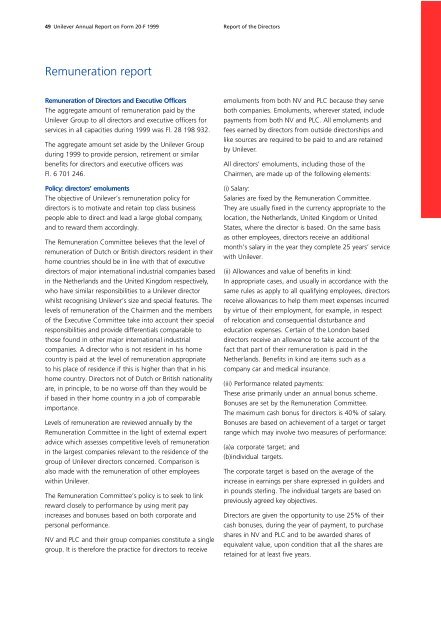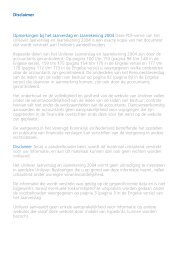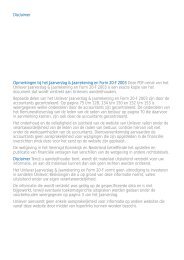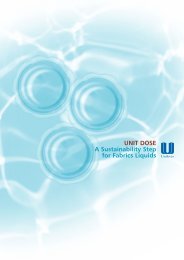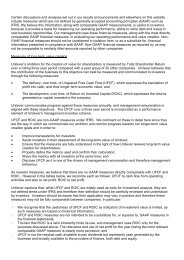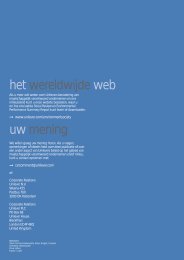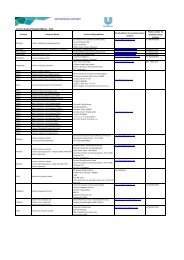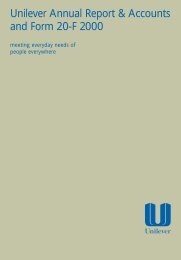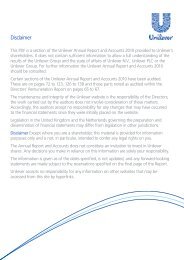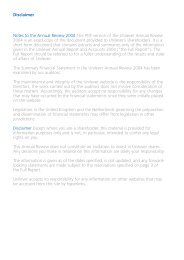Meeting everyday needs of people everywhere - Unilever
Meeting everyday needs of people everywhere - Unilever
Meeting everyday needs of people everywhere - Unilever
You also want an ePaper? Increase the reach of your titles
YUMPU automatically turns print PDFs into web optimized ePapers that Google loves.
49 <strong>Unilever</strong> Annual Report on Form 20-F 1999 Report <strong>of</strong> the Directors<br />
Remuneration report<br />
Remuneration <strong>of</strong> Directors and Executive Officers<br />
The aggregate amount <strong>of</strong> remuneration paid by the<br />
<strong>Unilever</strong> Group to all directors and executive <strong>of</strong>ficers for<br />
services in all capacities during 1999 was Fl. 28 198 932.<br />
The aggregate amount set aside by the <strong>Unilever</strong> Group<br />
during 1999 to provide pension, retirement or similar<br />
benefits for directors and executive <strong>of</strong>ficers was<br />
Fl. 6 701 246.<br />
Policy: directors’ emoluments<br />
The objective <strong>of</strong> <strong>Unilever</strong>’s remuneration policy for<br />
directors is to motivate and retain top class business<br />
<strong>people</strong> able to direct and lead a large global company,<br />
and to reward them accordingly.<br />
The Remuneration Committee believes that the level <strong>of</strong><br />
remuneration <strong>of</strong> Dutch or British directors resident in their<br />
home countries should be in line with that <strong>of</strong> executive<br />
directors <strong>of</strong> major international industrial companies based<br />
in the Netherlands and the United Kingdom respectively,<br />
who have similar responsibilities to a <strong>Unilever</strong> director<br />
whilst recognising <strong>Unilever</strong>’s size and special features. The<br />
levels <strong>of</strong> remuneration <strong>of</strong> the Chairmen and the members<br />
<strong>of</strong> the Executive Committee take into account their special<br />
responsibilities and provide differentials comparable to<br />
those found in other major international industrial<br />
companies. A director who is not resident in his home<br />
country is paid at the level <strong>of</strong> remuneration appropriate<br />
to his place <strong>of</strong> residence if this is higher than that in his<br />
home country. Directors not <strong>of</strong> Dutch or British nationality<br />
are, in principle, to be no worse <strong>of</strong>f than they would be<br />
if based in their home country in a job <strong>of</strong> comparable<br />
importance.<br />
Levels <strong>of</strong> remuneration are reviewed annually by the<br />
Remuneration Committee in the light <strong>of</strong> external expert<br />
advice which assesses competitive levels <strong>of</strong> remuneration<br />
in the largest companies relevant to the residence <strong>of</strong> the<br />
group <strong>of</strong> <strong>Unilever</strong> directors concerned. Comparison is<br />
also made with the remuneration <strong>of</strong> other employees<br />
within <strong>Unilever</strong>.<br />
The Remuneration Committee’s policy is to seek to link<br />
reward closely to performance by using merit pay<br />
increases and bonuses based on both corporate and<br />
personal performance.<br />
NV and PLC and their group companies constitute a single<br />
group. It is therefore the practice for directors to receive<br />
emoluments from both NV and PLC because they serve<br />
both companies. Emoluments, wherever stated, include<br />
payments from both NV and PLC. All emoluments and<br />
fees earned by directors from outside directorships and<br />
like sources are required to be paid to and are retained<br />
by <strong>Unilever</strong>.<br />
All directors’ emoluments, including those <strong>of</strong> the<br />
Chairmen, are made up <strong>of</strong> the following elements:<br />
(i) Salary:<br />
Salaries are fixed by the Remuneration Committee.<br />
They are usually fixed in the currency appropriate to the<br />
location, the Netherlands, United Kingdom or United<br />
States, where the director is based. On the same basis<br />
as other employees, directors receive an additional<br />
month’s salary in the year they complete 25 years’ service<br />
with <strong>Unilever</strong>.<br />
(ii) Allowances and value <strong>of</strong> benefits in kind:<br />
In appropriate cases, and usually in accordance with the<br />
same rules as apply to all qualifying employees, dire c t o r s<br />
receive allowances to help them meet expenses incurre d<br />
by virtue <strong>of</strong> their employment, for example, in re s p e c t<br />
o f relocation and consequential disturbance and<br />
education expenses. Certain <strong>of</strong> the London based<br />
d i rectors receive an allowance to take account <strong>of</strong> the<br />
f a c t that part <strong>of</strong> their remuneration is paid in the<br />
Netherlands. Benefits in kind are items such as a<br />
company car and medical insurance.<br />
(iii) Performance related payments:<br />
These arise primarily under an annual bonus scheme.<br />
Bonuses are set by the Remuneration Committee.<br />
The maximum cash bonus for directors is 40% <strong>of</strong> salary.<br />
Bonuses are based on achievement <strong>of</strong> a target or target<br />
range which may involve two measures <strong>of</strong> performance:<br />
(a)a corporate target; and<br />
(b)individual targets.<br />
The corporate target is based on the average <strong>of</strong> the<br />
increase in earnings per share expressed in guilders and<br />
in pounds sterling. The individual targets are based on<br />
previously agreed key objectives.<br />
Directors are given the opportunity to use 25% <strong>of</strong> their<br />
cash bonuses, during the year <strong>of</strong> payment, to purchase<br />
shares in NV and PLC and to be awarded shares <strong>of</strong><br />
equivalent value, upon condition that all the shares are<br />
retained for at least five years.


